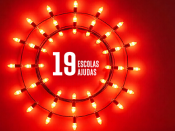Robert Gray
University of East Anglia
Abstract: Two fundamental finiteness properties in group theory are those of being finitely generated and of being finitely presented. These two properties were generalised to higher dimensions by C. T. C. Wall in 1965. A group G is said to be of type Fn if it has an Eilenberg–MacLane complex K(G,1) with finite n-skeleton. (Here K(G,1) is a certain nice topological space with fundamental group G.) It may be shown that a group is finitely generated if and only if it is of type F1 and is finitely presented if and only if it is of type F2. Related to this is a certain homological finiteness property called FPn. This property is defined for a monoid S in terms of the existence of certain resolutions of free left ZS-modules. The property FPn was introduced for groups by Bieri in (1976). In monoid and semigroup theory the property FPn arises naturally in the study of string rewriting systems. The connection between complete rewriting systems and homological finiteness properties is given by a result of Anick (1986) which shows that a monoid that admits such a presentation must be of type FPn for all n. The properties Fn and FPn are closely related.
In particular, for finitely presented groups they are equivalent. Because of the connection with rewriting systems, the finiteness property FPn for monoids has received a great deal of attention in the literature. It is sometimes easier to establish the topological finiteness properties Fn for a group than the homological finiteness properties FPn, especially if there is a suitable geometry/topological space on which the group acts in a nice way. Currently no theory of Fn exists for monoids. In this talk I will describe some recent joint work with Benjamin Steinberg (City College of New York) which was motivated by the question of developing a useful notion of Fn for monoids. This led us to develop a theory of monoids acting on CW complexes. I will explain the ideas we have developed and some of their applications.
This seminar is supported by National Funding from FCT - Fundação para a Ciência e a Tecnologia, under the project: UID/MULTI/04621/2013.
















